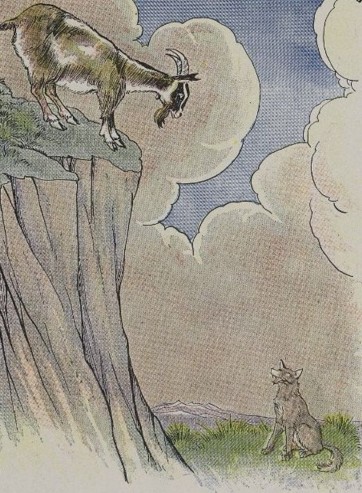PART A_1
Let’s learn vocabulary. Listen and repeat the words and the sentences with your tutor.
PART A_2
| 1. spy | /spay/ |
| -to secretly watch someone | |
| She spies on her husband to know if he has an illicit affair. | |
| 2. pretend | /pri-TEND/ |
| -to behave as if something is true when it is not | |
| She pretended to be sick to avoid going to class. | |
| 3. anxious | /ENK-shus/ |
| -worried and nervous | |
| She was very anxious about the result of her medical tests. | |
| 4. appetite | /AP-e-tayt/ |
| -the feeling that you want to eat | |
| To fulfill her appetite, she went to a restaurant with a buffet. | |
| 5. fine | /fayn/ |
| -excellent or much better than average | |
| The restaurant nearby sells one of the finest wines in the country. |
PART B_1
Let’s read the story. Please read it aloud, and I will check your pronunciation and intonation.
PART B_2
The Wolf and the Goat

A hungry Wolf spied a Goat browsing at the top of a steep cliff where he could not possibly get at her.
“That is a very dangerous place for you,” he called out, pretending to be very anxious about the Goat’s safety. “What if you should fall! Please listen to me and come down! Here you can get all you want of the finest, tenderest grass in the country.”
The Goat looked over the edge of the cliff.
“How very, very anxious you are about me,” she said, “and how generous you are with your grass! But I know you! It’s your own appetite you are thinking of, not mine!”
An invitation prompted by selfishness is not to be accepted.
PART C_1
Let’s answer comprehension questions. Please answer them based on the story.
PART C_2
| 1. | What did the Wolf pretend to feel about the Goat? |
| 2. | Was the Wolf successful with his plan? |
| 3. | How did the Goat react to the Wolf’s play? |
PART D_1
Let’s discuss the story. Please answer the questions below and express your opinions.
PART D_2
| 1. | Why did the Wolf pretend to care about the Goat’s safety? |
| 2. | Why did the Goat refuse to trust the Golf? |
| 3. | What do you think should the Goat do to escape from the Wolf? Please explain your answer. |
| 4. | Do you agree with the lesson of the story? Why or why not? |
| 5. | How do you determine if the invitation is driven by selfishness? |
REVIEW AND FEEDBACK
Now, let us review the things that you learned in this lesson.
ではこのレッスンで学んだことを振り返りましょう。
(Please give a short feedback on how your student did on your class.)
| Grammar 文法 |
Pronunciation 発音 | Vocabulary 単語 |
Comprehension 理解 |
|
|---|---|---|---|---|
 GOOD GOOD |
文法の誤りはほとんどなく、完全な文章で話すことができる | ほとんどの単語をはっきりと正しく発音することができる | 習った表現を適切に使うことができる | 文章を理解し、質問に正しく答えることができる |
 FAIR |
文法の誤りはあるが、完全な文章で話すことができる | 発音の練習が必要な言葉がいくつかある | たまにミスはあるが、習った表現を適切に使うことができる | 文章を完全に理解するのは難しく、質問に正しく答えられないときもある |
 POOR |
文章で話すのは難しく、単語だけで話すことができる | 発音の練習が必要である | 習った単語と表現を少しだけ使うことができる | 文章を理解するのは難しく、質問に答えるのは難しい |
Parts of this lesson material are based on:
An eBook from The Project Gutenberg.
This eBook is for the use of anyone anywhere at no cost and with almost no restrictions whatsoever. You may copy it, give it away or re-use it under the terms of the Project Gutenberg License included with this eBook or online at www.gutenberg.org
An eBook from The Project Gutenberg.
This eBook is for the use of anyone anywhere at no cost and with almost no restrictions whatsoever. You may copy it, give it away or re-use it under the terms of the Project Gutenberg License included with this eBook or online at www.gutenberg.org